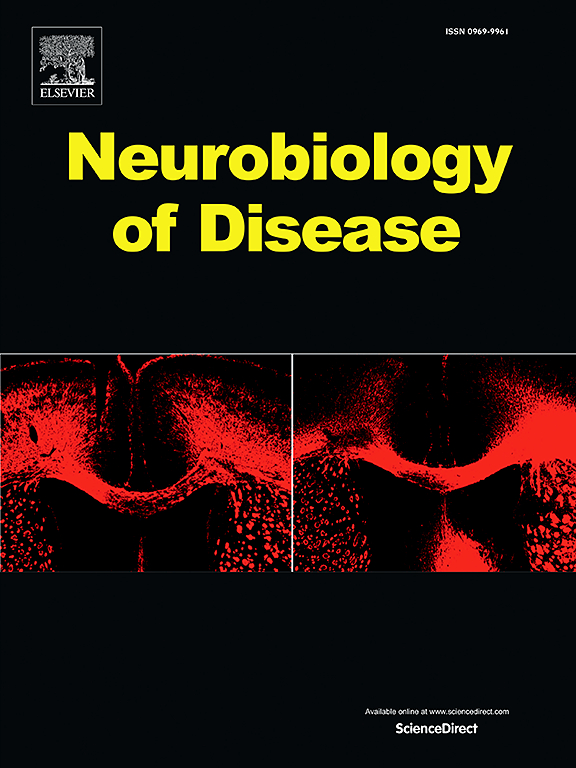Dopamine D2 receptor-mediated epidermal growth factor receptor signaling regulates neurogenesis in the subventricular zone of adult brain
IF 5.6
2区 医学
Q1 NEUROSCIENCES
引用次数: 0
Abstract
Mechanisms underlying selective dopaminergic neuronal degeneration in Parkinson's disease (PD) remain unclear. Impaired adult neurogenesis has been implicated in PD pathology, but its molecular regulation is not fully understood. We previously reported that dopamine D2 receptor (D2R)-mediated epidermal growth factor receptor (EGFR) signaling is critical for dopaminergic neuron development. To analyze how alterations in the dopamine system, especially D2R signaling in association with EGFR, contribute to dopamine-related dysfunction in vivo, we established a D2R cell-specific EGFR-deleted animal model, Drd2-Cre; EGFRf/f mice. These mice displayed a significant reduction in motor coordination ability and a decrease in the number of dopaminergic neurons in the midbrain, which resembles the characteristics of PD. We observed a reduction in the number of newly generated cells in the subventricular zone (SVZ) of aged Drd2-Cre; EGFRf/f mice, suggesting that the absence of EGFR in D2R-expressing cells could induce altered adult neurogenesis in the SVZ. Furthermore, when we compared the effect of l-3,4-dihydroxyphenylalanine (l-DOPA) on SVZ proliferation in 6-OHDA-lesioned control EGFRf/f and Drd2-Cre; EGFRf/f mice, the Drd2-Cre; EGFRf/f mice exhibited hindered L-DOPA-induced SVZ proliferation, indicating that D2R–EGFR signaling is necessary for the dopaminergic regulation of SVZ neurogenesis. These findings suggest that D2R–EGFR signaling is essential for maintaining midbrain dopaminergic neuron integrity and supporting adult neurogenesis, highlighting this pathway as a potential therapeutic target for promoting endogenous regenerative responses in PD.
多巴胺D2受体介导的表皮生长因子受体信号传导调节成人脑室下区神经发生
帕金森病(PD)选择性多巴胺能神经元变性的机制尚不清楚。成人神经发生受损与PD病理有关,但其分子调控尚不完全清楚。我们之前报道过多巴胺D2受体(D2R)介导的表皮生长因子受体(EGFR)信号传导对多巴胺能神经元的发育至关重要。为了分析多巴胺系统的改变,特别是与EGFR相关的D2R信号的改变如何导致体内多巴胺相关功能障碍,我们建立了D2R细胞特异性EGFR缺失的动物模型,Drd2-Cre;EGFRf / f老鼠。这些小鼠表现出运动协调能力的显著下降和中脑多巴胺能神经元数量的减少,这与PD的特征相似。我们观察到老年Drd2-Cre心室下区(SVZ)新生细胞数量减少;EGFRf/f小鼠,提示在表达d2r的细胞中缺乏EGFR可诱导SVZ成人神经发生改变。此外,当我们比较l-3,4-二羟基苯丙氨酸(l-DOPA)对6- ohda损伤对照中SVZ增殖的影响时,EGFRf/f和Drd2-Cre;EGFRf/f小鼠,Drd2-Cre;EGFRf/f小鼠表现出l - dopa诱导的SVZ增殖受阻,表明D2R-EGFR信号在SVZ神经发生的多巴胺能调节中是必要的。这些研究结果表明,D2R-EGFR信号传导对于维持中脑多巴胺能神经元的完整性和支持成人神经发生至关重要,强调该途径是促进PD内源性再生反应的潜在治疗靶点。
本文章由计算机程序翻译,如有差异,请以英文原文为准。
求助全文
约1分钟内获得全文
求助全文
来源期刊

Neurobiology of Disease
医学-神经科学
CiteScore
11.20
自引率
3.30%
发文量
270
审稿时长
76 days
期刊介绍:
Neurobiology of Disease is a major international journal at the interface between basic and clinical neuroscience. The journal provides a forum for the publication of top quality research papers on: molecular and cellular definitions of disease mechanisms, the neural systems and underpinning behavioral disorders, the genetics of inherited neurological and psychiatric diseases, nervous system aging, and findings relevant to the development of new therapies.
 求助内容:
求助内容: 应助结果提醒方式:
应助结果提醒方式:


